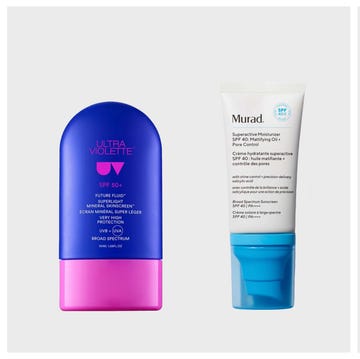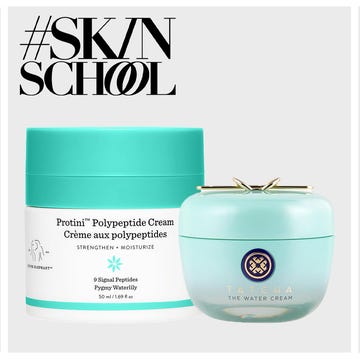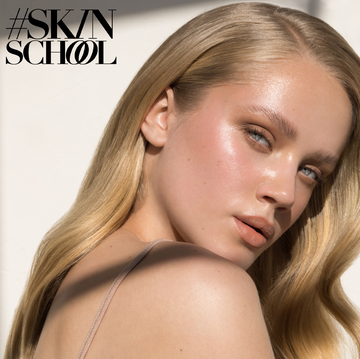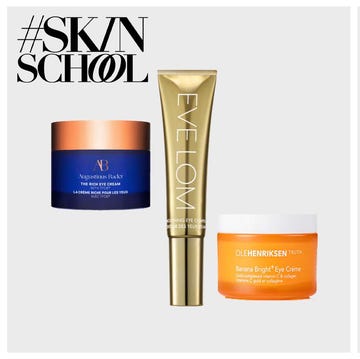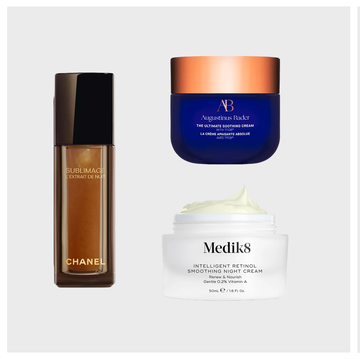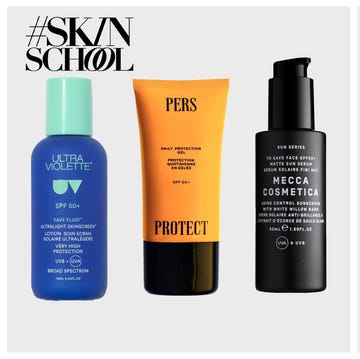We earn a commission for products purchased through some links in this article.

#SkinSchool: Why glycerin is the unsung hero of skin hydration
It's widely-used in most formulas, but how exactly does it work?
When it comes to maintaining the skin's hydration levels, hyaluronic acid and squalane are some of the most talked-about ingredients. But nestled within most of the skincare products on your shelf is a stealth hardworker, glycerin: a colourless, odourless, sweet-tasting liquid that's been used in beauty and hygiene preparations for decades.
The history of man-made glycerin (also known as glycerol) dates back to 1779 when Swedish chemist K. W. Scheele discovered the molecule. Fast forward to now, and glycerin is widely-used not only in topical cosmetics but also in food and supplements as an emulsifier and thickener.
Best glycerin-infused skincare
What is glycerin?
Modern day glycerin is often sourced from plant or animal fats, but "manufacturers can also synthetically produce glycerol," says the skin expert and facialist, Joanne Evans at Skin Matters. "For vegetable glycerin, common sources include triglyceride-rich vegetable fats, such as soy, coconut, and palm oils. Most vegetable glycerin comes as a byproduct of industrial chemical reactions," adds Evans.
While animal fats have historically been used as a source, it is now much less common due to ethical concerns. "Synthetic glycerin can also be produced from petroleum, but natural glycerin is preferred due as it's more sustainable," Evans tells Bazaar.
Our body naturally produces glycerin as a byproduct of fat breakdown. "It plays a key role in cellular structure and also functions as a moisture-retaining compound within the body and skin," shares Dr Bushra Yusuf, who's part of The Ordinary's Lab Team. "Within the skin, glycerin can also come from a few additional sources, including from the breakdown of sebum. As part of the skin’s natural moisturising system, glycerin plays a role in skin hydration, elasticity and barrier repair.
"In skincare, its function is similar in that it holds water, helping to hydrate and maintain skin moisture, promoting supple, healthy skin with a smoother appearance."
What are the benefits of glycerin in skincare?
- It performs as a humectant. "This means it attracts and draws moisture from the air to hydrate the skin. It makes it a key ingredient for moisturising dry and dehydrated skin," says Evans. "It's often found in lotions, creams, cleansers, and serums due to its ability to lock in moisture and leave the skin feeling soft and supple."
- It cushions harsher ingredients. While retinol is the dermatologist-favourite ingredient for line-smoothing and exfoliating acids are essential for sloughing away dead skin, the inclusion of glycerin into a skincare formula will add extra hydrating benefits to minimise irritation.
- It protects the skin's natural barrier. "Studies indicate that glycerin supports the skin barrier by interacting with the skin’s cells and fats, further contributing to skin hydration," says Dr Yusuf.
Who should use glycerin?
According to Evans, most skin types will benefit as "similar to hyaluronic acid, glycerin mimics the skin's natural moisturising factors". Since glycerin doesn't tend to clog pores, it also plays well with acne-prone and oily skin.
Glycerin has a strong safety profile but that said, anybody can be allergic to anything, so if you are concerned about skin reaction, a patch-test is always useful.
How to find the best glycerin skincare for you
According to Dr Yusuf, glycerin is considered to be chemically stable which means it does not easily react with other ingredients. That's why you're likely to come across it in most beauty products. Adds Dr Yusuf: "It has a smooth, slippery consistency which can help create a silky, easy-to-apply texture."
Glycerin on its own can do wonders for hydration, but well-formulated skincare should have active ingredients and additional nourishment to perform holistically - from plumping (look to peptides), soothing (try cica), brightening (vitamin C and lactic acid will do well here) to clarifying (opt for salicylic acid).
For Evans, she's a big fan of pairing glycerin with probiotics. "Glycerin is a key ingredient in my Calming Gel. The probiotics will feed off the sugar in glycerin, making glycerin a great prebiotic," she explains.
It also pairs especially well with ingredients focusing on hydration and skin barrier care. "Ingredients like natural moisturising factors (NMFs), hyaluronic acid and ceramides can work well together with glycerin to support moisture retention and soothe the skin," says Dr Yusuf.
Always look at your skincare formula as a whole to ensure that there is nothing else within the ingredient list that can wreak havoc on your complexion - be it a heavy oil for blemish-prone skin or harsh acids for sensitive complexions.
The best glycerin skincare products for alleviating dry skin this winter












